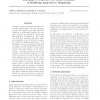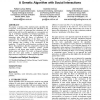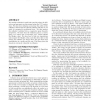85 search results - page 5 / 17 » Applications of approximation algorithms to cooperative game... |
IROS
2007
IEEE
14 years 1 months ago
2007
IEEE
— Multi-agent systems (MAS) are a field of study of growing interest in a variety of domains such as robotics or distributed controls. The article focuses on decentralized reinf...
ICML
2003
IEEE
14 years 8 months ago
2003
IEEE
Learning in many multi-agent settings is inherently repeated play. This calls into question the naive application of single play Nash equilibria in multi-agent learning and sugges...
GECCO
2009
Springer
14 years 1 months ago
2009
Springer
We propose a variation of the standard genetic algorithm that incorporates social interaction between the individuals in the population. Our goal is to understand the evolutionary...
ATAL
2010
Springer
13 years 8 months ago
2010
Springer
We consider collusion in multi-unit auctions where the allocation and payments are determined using the VCG mechanism. We show how collusion can increase the utility of the collud...
ATAL
2008
Springer
13 years 9 months ago
2008
Springer
When exploring a game over a large strategy space, it may not be feasible or cost-effective to evaluate the payoff of every relevant strategy profile. For example, determining a p...



